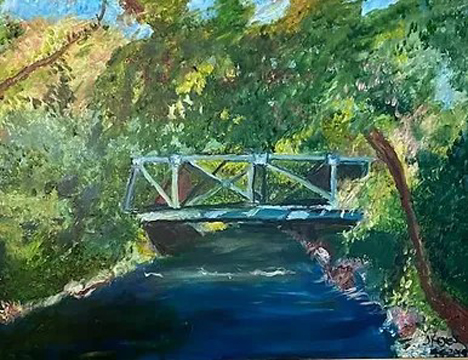My Life on the Whippany River
Joseph W. Keyes
©
Copyright 2024 by Joseph W. Keyes

|

Painting by the author. |
The
banks of the Whippany River in the early 1950s led to the muddiest,
laziest, but most sanguine water--river water. I lived a few hundred
yards from where it crossed Abbott Avenue under a dingy, white steel
bridge.
An
ominous huge siren stood high above the street corner on a utility
pole at a corner adjacent to the bridge. We always knew when it was
noon and five o’clock each day. The siren also told us when and
where there were any fire emergencies.
A
large chemical company, a paper company, an upholstery shop, and the
back acres of Evergreen Cemetery, where we poached evergreen branches
at Christmas to decorate our doorways, shared the river's north bank.
Dragging over-sized boughs up the bank, across the bridge, and back
to the house to be trimmed and nailed up into place was a holiday
ritual that we little kids, those being my cousin Georgie, Boomer,
Sammy, and me, relished being included.
On
the south side, our side, were another chemical company, a poultry
feed company, and a big oil storage site, which was off-limits to us
by decree of our older cousins—the big kids. The big kids were
my cousins, Genie, Davie, Billie, and their friends.
Following
the river west brought us to the Consumer Coal Company, one of our
favorite travel destinations. Jumping from the eaves four feet above
into a giant bin of coal beneath was about as much fun as a little
kid could hope for on a muggy summer day!
Eventually,
the river flowed past the hallowed Morristown-Erie railroad
roundhouse, which housed a powerful red diesel-electric engine that
ran between Morristown and Whippany with various freight cars
attached. Paper, steel piping, coal, and finished goods were among
the many products hauled back and forth to loading docks between
Morristown and Whippany. It was a very profitable twelve-mile rail
stretch in its day. My older brother, Frank, and his friends thought
it ‘cool’ to lay between the
rails while empty box cars passed over them. Personally, I never saw
the greatness in that activity. But I was just one of the ‘little
kids.’
“Don’t
swim in that river; it’s too dirty,” our parents warned.
So
naturally, when the weather was good, every kid made a beeline to it
and proceeded to jump, swim, and wade in the muddy brown water. The
summer heat produced a distinct, swampy aroma from the water, and
bugs of every scary shape and species—mosquitoes, dragonflies,
horseflies, and bees—tormented us!
“OW!”
Some bitten kid shrieked. “Rub some mud on it!” Davey
yelled. The
big kids knew everything!
“Mom
wants us home by twelve. We’re gonna go to the pool!” my
sister, Mary Ann, reminded us. Nobody had a watch, and we didn’t
need one. The deafening siren soon told us it was noon.
One
hot summer afternoon, my cousins and a neighborhood friend lugged a
raft we constructed out of a four-by-eight foot, three-quarter-inch
thick piece of plywood the day before. The big kids were confident
it would be kept buoyant by two automobile inner tubes tied to the
bottom of the platform. Engineering and physics may not
have
been on our side, but God was and had to be!
“Okay,
let’s
bring ‘er down!” Davey ordered.
Me,
Georgie, Davey,
and Frankie, Davie’s best friend, each grabbed a side of the
raft, and after a bit of wobbling and re-balancing, we were off down
the driveway and onto the sidewalk headed to the river.
The
trip down the bank to the river was an adventure in itself. Inverted,
tube-side up, the raft slid quickly over the brush, down the bank,
and into the river, followed by four screaming kids yelling at it to
stop before it reached the river. With help from a sizeable stubborn
sumac tree stump, the
runaway raft was
halted two feet before the water could take ownership.
“Geez!
We almost lost it!” Davy shouted. “We need to put a tow
rope on one end to pull it back up,” he continued. The
big kids knew everything!
Frankie
‘got volunteered’ to pilot our raft on its maiden voyage.
Carefully creeping onto the center of the deck, he knelt and
hand-paddled out to the center of the river. All looked good! But
then, the raft started to rock, sending Frankie, arms flailing, over
the side into the water, hollering and cussing the whole time.
“Hey!
Get me outta here!” Frankie shrieked after regaining his
balance.
Davey
took off his sneakers, rolled up his pant legs, waded out to the
middle of the river, and grabbed Frankie’s arm.
“My
mom’s gonna kill me! These are my school pants!”
After
Frankie dried himself off as best as possible, he put on his dank,
swampy-smelling clothes. We all packed our stuff and headed home
carrying our now river-christened raft. We were all making mental
notes about improving the raft.
The
whole matter was forgotten by dinnertime. Later that summer, our raft
made a couple more trips in the river with someone always
deliberately trying to capsize it! The plywood eventually ceded to
the dankness of the river and, I imagine, still lies at the bottom as
a testament to the brave crew from Abbott Avenue and the indomitable
Whippany River!
Joe is a
writer and artist with stories and many enjoyable paintings to
show. In his stories, Joe tells you about himself, the people
dear to him, and his life growing up in Morristown, New Jersey.
This is a chapter
from a more extensive, unpublished memoir.
(Unless
you
type
the
author's name
in
the subject
line
of the message
we
won't know where to send it.)
Book
Case
Home
Page
The
Preservation Foundation, Inc., A Nonprofit Book Publisher



